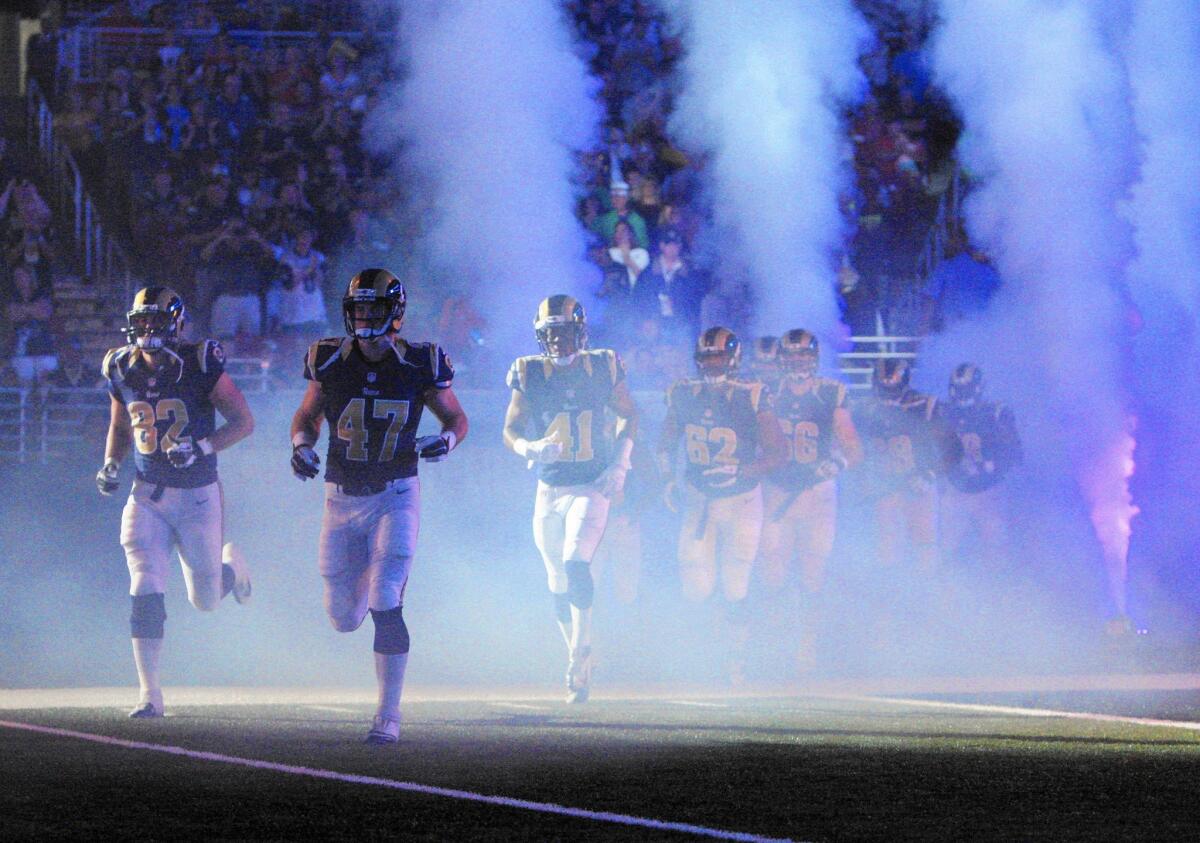In St. Louis, Rams fans seem resigned to losing football team

- Share via
REPORTING FROM ST. LOUIS — Brian King was just a kid when the Rams came to St. Louis, and his parents bought season tickets.
The family had suffered the departure of the football Cardinals, and now they could rally around a new Sunday tradition in the Trans World Dome. Soon they would have a Super Bowl winner on their hands, led by a high-flying pass offense called the Greatest Show on Turf.
“It has become a part of the family. That’s what makes this so disappointing,” said King, who still has those season tickets 20 years later. “I like to think, with my nieces and nephews, that we’d have that opportunity.”
Those winning days are long gone, and King, like most other fans in this Mississippi River city, figures the Rams will soon be gone for good.
While Angelenos are skeptical of the latest plan to return pro football to L.A., many St. Louis fans seem resigned to losing their second NFL franchise in 30 years. Last week’s announcement that Rams owner Stan Kroenke plans to build an NFL stadium in Inglewood dashed already dampened hopes that Missouri could keep the Rams from bailing.
“Up until Monday, I thought they were going to stay,” King said. “Once you see that proposal, it’s hard to blame them for leaving. It’s probably going to happen.”
Kroenke’s wandering eye has also kicked off a debate of how much tax money the city should spend trying to keep a perennial loser that has always played second fiddle to the winning baseball Cardinals.
City leaders unveiled plans on Friday for a $900-million open-air stadium on the banks of the Mississippi River, with Missouri taxpayers covering about half the cost.
“The Rams are our team,” said David Peacock, a former Anheuser-Busch executive who’s leading the stadium project. “We need to fight for what’s ours.”
Not everyone here is committed to the fight. The project would require $340 million to $405 million in state money, much of which would need the blessing of Missouri’s legislature. Leaders there have been conspicuously silent about their willingness to pay. And local leaders have promised a public vote before any “new” tax money is raised, a vote many observers say would be a tough sell.
“I think there’d be fierce opposition,” said Jim Shrewsbury, a former president of the St. Louis Board of Aldermen who heads the public authority that owns the Rams stadium, now called the Edward Jones Dome.
Kroenke’s Inglewood stadium, by contrast, would be financed with private money; there’s been no mention of public financing.
The Rams do bring value to the St. Louis region, said Howard Wall, an economics professor at Lindenwood University in suburban St. Charles. But in a cash-strapped state with many needs — from roads to schools to the aftermath of this summer’s unrest in Ferguson — shelling out for a football team doesn’t seem so essential.
With such pressing priorities, Wall said, many are asking: “Should we spend a half-billion dollars on a football stadium for a billionaire?”
St. Louis is still paying on the bill for bringing the Rams here in the first place. The original stadium deal gave the team one of the sweetest deals in league history. State and local governments financed nearly the entire cost of the $280-million dome, then gave the team a cheap lease and control of most of the revenue from games.
The city also agreed to a clause in the lease that let the Rams leave town if the Dome isn’t in the top fourth of NFL stadiums after 20 years. Today, the gloomy arena is nowhere close, and the Rams are free to go.
“They gave the Rams the sun, the moon and the stars back then. And the Edward Jones Dome isn’t even paid off yet,” said Fred Lindecke, head of a local group called Coalition Against Public Funding for Stadiums. “Now they want to start all over again? It doesn’t make any sense.”
Then there’s this: While the NFL is the most popular sport in the nation and in most of its markets, it’s not even close in St. Louis.
That’s plain to see at Johnny Mac’s, a local sporting-good store in suburban Crestwood.
“This is a baseball town,” said manager Cory Spradling. “People buy Rams stuff at the start of their season. But all summer it’s Cardinals. At Christmas it’s Cardinals. It’s pretty much always Cardinals.”
The Cardinals routinely sell 3 million tickets a year at Busch Stadium. They draw thousands to their annual Winter Warmup fundraiser and autograph session each January.
And when they make the playoffs — a near-annual occurrence lately — local grade schools will often suspend uniform policies in favor of Cardinals garb. Even the water in downtown fountains is dyed red.
The Rams, on the other hand, haven’t made the playoffs since 2004. Only the Oakland Raiders have lost more games in the last decade. (The Raiders and Rams both left Los Angeles in 1995.) The Rams’ TV ratings in St. Louis are also among the worst in the league.
That’s not to say St. Louis hasn’t supported the Rams. The team sold out every game for its first 11 seasons here. Even in the rough years since — including a three-year stretch when the team won a total of six games — the Edward Jones Dome is nearly full most Sundays.
The Dome isn’t the problem, said Matt Poe, a fan who attends about four games a year. It’s the product on the field.
“Back in 1999, it was the same dome. Nobody complained about it then,” said Poe, recalling that glorious Super Bowl year. “I was at the Broncos game this year, and the place was going nuts. No one was saying, ‘I don’t like the stadium.’ They were saying, ‘We’re about to beat Peyton Manning.’”
Poe, 32, is part of a generation of St. Louisans old enough to remember life without the NFL, but young enough to have been raised on the Rams. He’s been a fan ever since he watched the team’s trucks pull into town on the TV news.
To him, they’re part of the life of the city. If Kroenke pulls up stakes for L.A., Poe said he’d probably still follow the team from afar — though “it would hurt.”
He predicted the Rams would struggle in L.A., a region where many transplants already have a favorite NFL team.
“This is our team,” Poe said. “It’s no longer the L.A. Rams. It’s the St. Louis Rams.”
King is in that generation, too, and he has good memories of game days with his family, of piling in with a couple of dozen cousins to watch the team’s first playoff game on TV. But he also remembers the slightly awkward applause that would fill the Dome when the team would honor some retired star from the L.A. years.
“Now,” he said, “the whole thing just seems a little borrowed.”
Twitter: @bytimlogan
More to Read
Inside the business of entertainment
The Wide Shot brings you news, analysis and insights on everything from streaming wars to production — and what it all means for the future.
You may occasionally receive promotional content from the Los Angeles Times.











